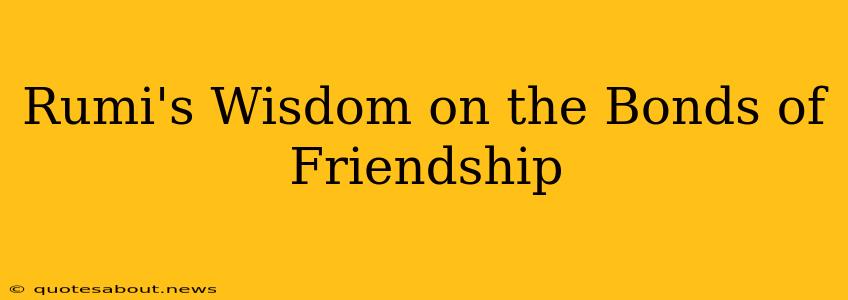Rumi, the 13th-century Persian poet and Sufi mystic, understood the profound significance of friendship. His poetry isn't just beautiful verse; it's a roadmap to the soul, and his words on friendship offer invaluable insights into building meaningful connections that enrich our lives. This exploration delves into Rumi's wisdom, exploring the nature of true friendship, its challenges, and its ultimate rewards. We'll also address some common questions surrounding Rumi's perspective on this vital human connection.
What does Rumi say about true friendship?
Rumi believed true friendship transcended the superficial. It wasn't merely about shared laughter and pleasantries; it was about a deep, soulful connection that fostered growth and understanding. He saw friendship as a mirror reflecting our truest selves, challenging us to confront our shadows and embrace our light. His poems frequently depict friends as fellow travelers on a spiritual journey, supporting each other through life's trials and celebrating each other's triumphs. This profound connection, according to Rumi, is a gift beyond measure, a bond that nourishes the spirit and elevates the soul. He emphasizes the importance of selfless love and unwavering support within this bond.
How does Rumi describe the characteristics of a true friend?
For Rumi, a true friend possesses several key characteristics. Loyalty and trust are paramount. A true friend is someone you can confide in without fear of judgment, someone who will stand by you through thick and thin. Honesty, even when it's difficult to hear, is another crucial element. A true friend will offer constructive criticism and challenge your perspectives, helping you grow as a person. Empathy and compassion are also vital; a true friend understands and shares your joys and sorrows, offering solace and support during difficult times. Finally, Rumi emphasizes the importance of unconditional love, a love that doesn't waver based on circumstances or personal flaws.
What are the challenges of friendship according to Rumi?
While Rumi celebrated the beauty of friendship, he also acknowledged its inherent challenges. He understood that disagreements and conflicts are inevitable. The test of a true friendship, he implied, lies in how these conflicts are navigated. Are friends able to communicate openly and honestly, resolving differences with empathy and understanding? Or do disagreements lead to resentment and the eventual fracturing of the bond? Rumi's work suggests that true friendships require effort, forgiveness, and a willingness to work through challenges to maintain the connection. He highlights the importance of self-awareness in navigating these challenges, urging us to understand our own roles in any conflict.
Does Rumi's view on friendship differ from modern concepts?
While the core values Rumi emphasized – loyalty, trust, honesty, empathy – remain relevant in modern concepts of friendship, there might be subtle differences in emphasis. Modern society is often fast-paced and fragmented, leading to a larger number of acquaintances than deep, meaningful friendships. Rumi's focus on the profound spiritual connection inherent in true friendship might stand in contrast to the more casual nature of some modern friendships. However, the enduring wisdom in his poetry continues to resonate with readers seeking genuine connection and lasting bonds, irrespective of cultural or temporal contexts. His emphasis on self-awareness and working through challenges remains highly pertinent to navigating the complexities of modern relationships.
How can we apply Rumi's wisdom to our own friendships?
Applying Rumi's wisdom to our friendships involves cultivating self-awareness, actively nurturing existing bonds, and striving for authenticity. This means being honest with ourselves and our friends, even when it’s uncomfortable. It means actively listening, truly hearing what our friends are saying, and responding with empathy and understanding. It means forgiving transgressions and choosing to nurture the relationship over letting minor disagreements fester. By striving for authenticity, offering unwavering support, and prioritizing genuine connection, we can build the kind of profound and enriching friendships that Rumi so eloquently celebrated. His work offers a timeless guide to cultivating deeper, more meaningful relationships in our lives.

